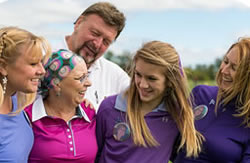Facing the Unknown

Making the Most of Cancer's Uncertainties
An unexpected diagnosis
Laura Fliss was busy living, working and spending time with her family before noticing a backache and some mild chest pain last spring. At 63, the married mother of two grown children runs a hair salon and day spa in Dearborn Heights, a job she's loved since it opened in 1984. She's a member of the Polish National Alliance, performing in its dance group for years.
When back spasms interrupted a summer trip with her granddaughter, Fliss returned home to receive a rare and serious diagnosis: cancer of unknown primary, also called CUP. What makes CUP unique is that it is advanced to the point where its genetic characteristics are lost, making it impossible to identify where the cancer started. For this reason, it is almost always metastatic and difficult to treat.
"My family rallied and was with me during summer vacation," Fliss says. "Of course I was scared, but they gave me the encouragement to fight and keep hope. If there’s not a cure, I'll have some time and make the most of it."
Springing into action

Fliss immediately began treatment under the care of Alex Pearson, M.D., Ph.D., who alongside Laurence Baker, D.O., started a clinic at the University of Michigan Rogel Cancer Center for patients diagnosed with CUP.
"Laura is a great example of someone who has been utilizing the benefits of her chemotherapy regimen to the most extent," Pearson says. "She's taking day trips, spending time with her family, fundraising and working."
Pearson explains the goal for treatment of CUP today is not to cure, but to reduce a patient's symptoms so life can go on and patients can continue to accomplish their goals. Chemotherapy with milder side effects has been used in her case to allow her to keep working as much as possible.
Busy living
Fliss made the decision early on to stay positive for the sake of her family. Though her treatment success is hard to predict, she has turned to her faith for help.
"I always knew I wanted to become a Catholic, especially when I got involved with the Polish National Alliance," Fliss says. "I thought about being confirmed in the 1980's when the pope was here. I never did it because I was always busy and working extra hours."
Fliss finally achieved that goal in September when she was confirmed into the Catholic faith in a private mass for her and her grandson Avery.
The CUP clinic aims to bring patients together to leverage their experiences and information in an effort to improve treatment options.
"We don't know enough about what pathways are involved in many cancers. We want to learn what genetic signals are being turned on and off. We believe there may be information that differentiates certain types of cancer. As we gain more information from patients, decision points based on genetic studies will allow us to provide more targeted treatment options."
~~Alex Pearson, M.D., Ph.D.
The hope is to take cancers with a poor prognosis, like CUP, and give patients like Fliss more and better treatments.
"I feel great," she says. "I feel blessed. It was something I should have done a long time ago."
Social Worker Donna Murphy, LMSW, CCLS, from the Rogel Cancer Center's PsychOncology Clinic says it's important for patients to continue to find their life’s meaning when facing uncertainty.
"One thing that's really hard about cancer is that it puts people into a place where they're forced to deal with the unknown in a way most people never know. No cancer is ever the same. You're beginning an uncharted journey," says Murphy.
Fliss decided to become actively involved in thecenter's new CUP clinic by joining a clinical trial and allowing her biopsy results to be analyzed for factors like genetic changes, what proteins are being expressed and what pathways are involved in her cancer. Understanding the genome may help researchers find better treatments for not just cancers, but also other genetic-related diseases.
"I want to do what I can to help," Fliss says. "If not myself, I'd like to help other people who are diagnosed with CUP in the future. It makes me feel like I’m taking some kind of action."

Looking to the future
With the support of her husband, John, her children and grandchildren, Fliss plans to continue her treatment regimen, continue working and spend as much time with loved ones as possible.
The family held a golf outing to raise funds for her treatment costs. Fliss’s daughters are in the process of developing a non-profit organization and website to raise money and awareness for CUP research.
"The most positive thing is my family and friends," Fliss says. "Not a day goes by when I don't receive a card in the mail giving me hope. You don't realize how many friends you have until something like this happens."
Call 800-865-1125 for details on the new clinic for cancer of unknown primary or to ask whether you might qualify for a clinical trial.
Continue reading the Winter, 2014 issue of Thrive.
